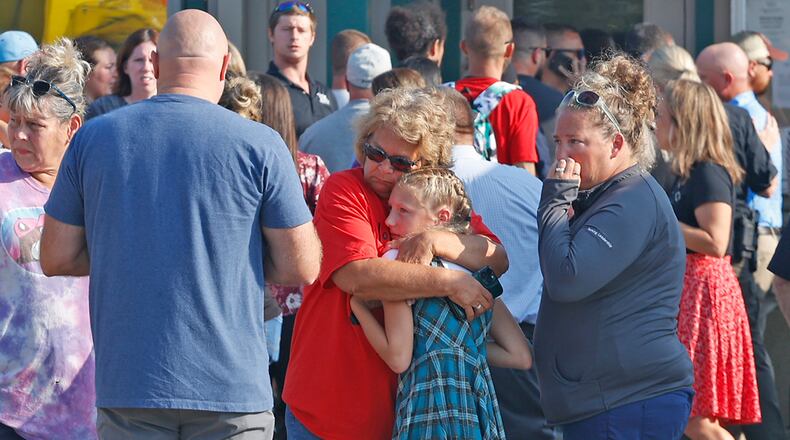“I think parents are going to want to be answering all of their kids’ questions as openly and honestly as they can,” said Dr. Julie Stucke, a child psychologist with Dayton Children’s.
Parents and guardians can initiate those conversations, opening the door to allow their kids to talk about the accident if they feel like they need to by asking what the kids have heard about the incident, Stucke said.
“Just be open and honest about it. This was a really scary thing that happened, and I’m sure a lot of people — parents and kids — are going to be scared moving forward,” Stucke said.
Given that it was an elementary school bus on the first day of school, for some of the children involved in the crash, this may have been their first time riding a school bus. Parents may have tough conversations preparing their kids to return to school buses after this incident, but Stucke continued to encourage parents to be open and to address their children’s concerns.
“I think parents, they need to be honest and they need to let their kids know that usually, school buses are very safe,” Stucke said.
Research shows that school buses are safer than passenger vehicles, Stucke said, so parents and guardians might need to explain to their children that sometimes accidents occur. They can also reassure their kids that adults will be looking at what happened “to try to make sure this never happens again,” she said.
School buses are among the safest vehicles on the road, the National Highway Traffic Safety Administration says, with less than 1% of all traffic fatalities involving children on school transportation vehicles.
Fatalities in school-transportation-related crashes were relatively the same in 2019 and 2021 — 111 and 108 fatalities, respectively — along with a drop to 54 fatalities in 2020, according to the National Highway Traffic Safety Administration. It’s estimated that of the fatalities involved with school bus crashes, only about 5% were school bus passengers, the majority being occupants of vehicles other than the school bus, according to the National Safety Council.
Parents should also pay attention to how they’re responding to and processing this event, Stucke said, encouraging parents to process their own emotions and anxiety, too.
“They might want to process some of their own anxiety away from their child, so that in front of their child, they can be as calm and as matter-of-fact as possible,” Stucke said. “Parents are going to need to deal with their own anxiety about this as well.”
In helping their kids process their anxiety, parents and adults should not avoid talking about what happened.
“I think talking about the accident is going to be important,” Stucke said. “They want to stay very matter-of-fact and calm when they’re talking about it.”
Parents and adults can also remind their children that they are safe now, Stucke said. They also can point to the positives in humanity, she said, like pointing out the first responders and people who came to help with the situation.
“All of these people came together to help,” Stucke said.
Parents can also talk to their kids about their own strategies in dealing or coping with stress.
“When I’m really stressed, maybe I close my eyes, and I take some deep breaths, and I imagine that I’m somewhere else for a couple minutes, or any other strategies that parents might have,” Stucke said.
Parents should also encourage their kids to participate in their usual activities, like sports or other clubs, to help kids return to a sense of normalcy. Parents should also try to make sure they’re not being too overprotective, Stucke said,
“That may be hard for them right now because their own anxiety is going to be high,” Stucke said. “But if they’re really overprotective, they’re going to possibly send a message to this child that they’re still in danger, and we don’t want children to feel like they’re still in danger.”
About the Author

